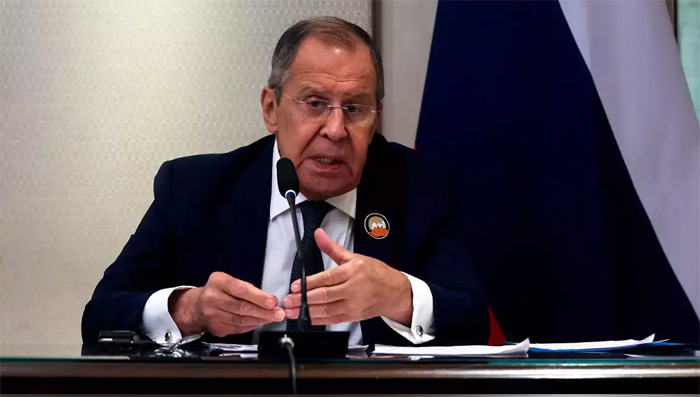Didn’t expect West to accept G20 declaration text on Ukraine, says Sergey Lavrov
The West’s efforts to “Ukrainise” the agenda of the G20 were prevented by the consolidation of the grouping’s members from the Global South, which is unwilling to be lectured to about the Ukraine crisis, Russian foreign minister Sergey Lavrov said on Sunday.
Addressing a news conference a day after the G20 Summit issued a leaders’ declaration that made no reference to Russia’s aggression against Ukraine, Lavrov said the active role of the Indian presidency of the grouping consolidated member states from the Global South – including Brazil, China and South Africa – to uphold and protect their legitimate interests.
The G20 members of the Global South prevented the efforts of the West to “Ukrainise” the agenda of the two-day summit, which was more about the awakening of developing countries that are “no longer willing” to be lectured to about Russia complying with Ukrainian President Volodymyr Zelenskyy’s peace formula, he said, speaking in Russian.
The leaders’ declaration is not an ultimatum to Russia, Lavrov said, thanking Russia’s “Indian friends” for laying a solid foundation for working towards the democratisation of international economic and financial relations.
He acknowledged that Russia hadn’t expected the West to accept the text finally used in the leaders’ declaration to refer to the Ukraine crisis. “When they agreed to that, perhaps it was the voice of their conscience. Speaking frankly, we didn’t expect that. We were 100% ready to defend our honest wording of the text,” he added.
Lavrov also said the text on the Ukraine crisis in the leaders’ declaration should not be seen in isolation. “Let me underline that we cannot isolate that [text] from the rest of the work in the declaration. The main content of the declaration this year is about the awakening…and the consolidation of the Global South, that is truly willing for the G20 to work for its main goals,” he said.
The Global South is also “not willing” to force Russia to comply with the “Zelenskyy formula” to end the conflict, he said, in a reference to the 10-point peace formula the Ukrainian leader had proposed at last year’s G20 Summit in Indonesia.
“The Global South is no longer willing to be lectured. They don’t want to hear anything about forcing Russia to comply with the Zelenskyy formula. I don’t want to talk about it, this formula is unrealistic,” he added.
Lavrov said a “healthy solution” was found in the declaration to ensure a clear and equitable balance of interests. “In our turn, we will continue strengthening these positive trends, including during Brazil’s presidency [of the G20] next year and in 2025, during South Africa’s presidency,” he said.
Russia will return to the Black Sea Grain Initiative “the same day” as Moscow’s conditions for export of its wheat, other grains and fertilisers to global markets are met, Lavrov said. Russia quit the deal in July, a year after it was brokered by the UN and Turkey, on the grounds that its exports were being hindered.
“When all the necessary actions for removing obstacles for our grain and fertiliser exports are implemented, the same day we will return to the collective implementation of the Ukrainian part of the Black Sea initiative,” Lavrov said.
The G20 leaders’ declaration on Saturday called for “full, timely and effective implementation to ensure the immediate and unimpeded deliveries of grain, foodstuffs, and fertilisers/inputs” from Russia and Ukraine to meet the needs of developing countries.
Lavrov also said Russia is not against negotiations to end the Ukraine conflict but talks should take into account “the realities on the ground” and “NATO’s aggressive policy”.
“Everyone wants peace…About 18 months ago, we agreed to sign a treaty about settling this conflict. We even initialled these documents. After that, the Anglo-Saxons ordered Zelenskyy not to sign it because they thought they would be able to reap some concessions from us,” he said.

